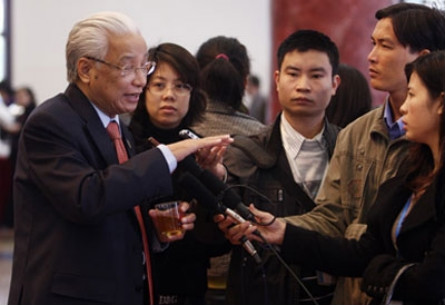Demand for foreign currency reveals need for stricter regulations
 |
| Cao Sy Kiem in the interview with reporters |
Kiem spoke with reporters outside of the National Assembly’s meeting in Hanoi, on March 28:
Is the government's request that all state-owned corporations must sell foreign currencies to banks a form of surrender?
No. Currency surrender would mean that businesses holding foreign currency would be forced to sell all or part of the currency to banks. Such a measure would come as an administrative order, and be considered as a sort of last resort.
Under the current requests of the SBV, only state-owned enterprises, which acquire an abundant supply of foreign currencies from their export activities, would have to sell those to banks. Other companies who need foreign currencies for their trade would be supplied with foreign currencies.
The foreign currencies that state-owned enterprises acquire belong to the state, so, these enterprises have a duty to provide the foreign currency for national economic stabilisation measures.
What do you think about the foreign exchange market after the government issued economic stabilisation policies, including Resolution 11?
The supply of foreign currencies has become more abundant. Banks have sold a total of more than $300 million. The governor of SBV announced that almost no bank has kept foreign currencies. But, in my opinion, a number of companies still keep foreign currencies. But, to date, there has been no official or reliable audit as to discern the amount of foreign currency being held by Vietnamese businesses.
Part of the reason that some companies hold on to foreign currencies is because there are still many obstacles for them to buy these currencies when they need. What do you think about this?
This situation may be attributed to our unclear foreign currency polices. For a long time, the policies have not been strictly enforced, and have failed to deal with the unofficial, or black, market. Now there has been a sudden and strict enforcement of new monetary policies.
Not only enterprises, but many people, who have legitimate demand still find hard to buy dollars. What is the main cause of this problem?
Several banks have planned to supply foreign currencies to customers through imposing fees. I think that, the SBV has to apply a clearer and stricter regulation to request all banks to meet all legitimate foreign currency needs.
Because just a few commercial banks can not satisfy all the demand for foreign currency, the SBV might think about issuing regulations with economic incentives to encourage banks provide for legal dollar demand, such as going abroad for medical reasons, study or tourism.
The SBV is banning the unofficial trade of foreign currencies, but this does not seem to be very effective. Does this undermine the public faith in the government’s ability to manage monetary policy?
In the past, regulations have not been enforced strictly enough. Now, the cooperation of agencies at all levels will be needed to create a more coherent overall policy. What is important is that we need to create an environment for the ligitimate foreign exchange market to exist.
The demand for foreign currency is normal and will not go away. If banks fail to meet this demand, it will naturally foster a black market.
What should be done to encourage people to sell their foreign currency?
People tend to protect the value of their assets by reserving gold and dollars. To deal with this issue in the long term, we need to maintain or raise the value of VND, along with the implementation of other policies.
What the stars mean:
★ Poor ★ ★ Promising ★★★ Good ★★★★ Very good ★★★★★ Exceptional
Related Contents
Latest News
More News
- Cashless payments hit 28 times GDP in 2025 (February 04, 2026 | 18:09)
- SSIAM and DBJ launch Japan Vietnam Capital Fund (February 04, 2026 | 15:57)
- Banks target stronger profits, credit growth in 2026 (February 04, 2026 | 15:43)
- Vietnam on path to investment-grade rating (February 03, 2026 | 13:07)
- Consumer finance sector posts sharp profit growth (February 03, 2026 | 13:05)
- Insurance market building the next chapter of protection (February 02, 2026 | 11:16)
- NAB Innovation Centre underscores Vietnam’s appeal for tech investment (January 30, 2026 | 11:16)
- Vietnam strengthens public debt management with World Bank and IMF (January 30, 2026 | 11:00)
- Corporate bond market poised for stronger growth cycle (January 28, 2026 | 17:13)
- Vietnam's IPO market on recovery trajectory (January 28, 2026 | 17:04)

 Tag:
Tag:




















 Mobile Version
Mobile Version